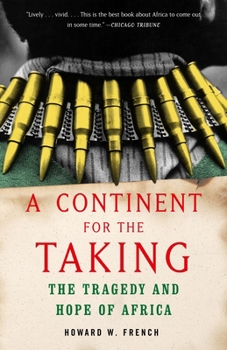A Continent for the Taking
Select Format
Select Condition 
Book Overview
In A Continent for the Taking Howard W. French, a veteran correspondent for The New York Times , gives a compelling firsthand account of some of Africa's most devastating recent history-from the fall of Mobutu Sese Seko, to Charles Taylor's arrival in Monrovia, to the genocide in Rwanda and the Congo that left millions dead. Blending eyewitness reportage with rich historical insight, French searches deeply into the causes of today's events, illuminating the debilitating legacy of colonization and the abiding hypocrisy and inhumanity of both Western and African political leaders. While he captures the tragedies that have repeatedly befallen Africa's peoples, French also opens our eyes to the immense possibility that lies in Africa's complexity, diversity, and myriad cultural strengths. The culmination of twenty-five years of passionate exploration and understanding, this is a powerful and ultimately hopeful book about a fascinating and misunderstood continent.
Format:Paperback
Language:English
ISBN:1400030277
ISBN13:9781400030279
Release Date:April 2005
Publisher:Knopf Doubleday Publishing Group
Length:320 Pages
Weight:0.72 lbs.
Dimensions:0.6" x 5.2" x 8.0"













